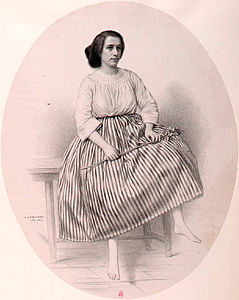Les dragons de Villars
| Opera dates | |
|---|---|
| Title: | The hermit's bell |
| Original title: | Les dragons de Villars |

Juliette Borghèse as Rose Friquet (1856) |
|
| Shape: | Opéra-comique in three acts |
| Original language: | French |
| Music: | Aimé Maillart |
| Libretto : | Eugène Lockroy and Eugène Cormon |
| Literary source: | George Sand : La petite Fadette |
| Premiere: | September 19, 1856 |
| Place of premiere: | Théâtre-Lyrique , Paris |
| Place and time of the action: | Period of Louis XIV. |
| people | |
Les dragons de Villars (German: The hermit's bell ) is an opera comique in three acts by Aimé Maillart based on a libretto by Eugène Lockroy and Eugène Cormon . The story of the opera comes from George Sand ( La petite Fadette ) and was transferred to the time of Louis XIV by the librettists . The play was premiered at the Théâtre-Lyrique in Paris on September 19, 1856 and first appeared at the Opéra-Comique on June 5, 1868, here with Célestine Galli-Marié (the first actress in the title role in Bizet's Carmen ) as Rose.
action
first act
Dragoons threaten to enter a village. The women must therefore be hidden from them and therefore housed in the rectory. Only Georgette is locked in a dovecote.
Commandant Belamy and his soldiers do not understand that it is completely quiet in the village. Only Rose Friquet chatted away. Georgette, the prettiest tenant, flirts with Belamy and calls him to the hermit's chapel for a rendezvous. But there is a little bell there that starts to ring when a couple becomes unfaithful.
Second act
The servant Sylvain is in love with Rose and she is in love with him, Thibaut is looking for his wife, who has met with Belamy, but the bell does not ring. Rose then begins ringing the bell herself when Georgette shows up to see Belamy. They feel caught, but Rose is soon exhausted. Silvain wakes her, but Belamy overhears her.
Third act
Thibault wants to thwart the wedding between Sylvain and Rose and claims that Rose has betrayed the hiding place in which the Huguenots are staying. Sylvain makes a scene for Rose. Georgette comes with the message that the refugees have already successfully fled. Belamy confronts Sylvain, but Georgette rushes over to help him. She threatens Belamy to reveal her affair to his boss. There are no longer any obstacles in the way of Sylvain and Rose. The dragoons go their way and calm returns.
History of origins and effects
The piece was first offered to Émile Perrin, the first director of the Opéra-Comique , who found the piece too gloomy, even after the composer had played it for him. It was then offered to one of the Seveste brothers at the Théâtre-Lyrique, who also declined, as was the brothers' successor, Pierre Pellegrin. A few years later, the authors met Léon Carvalho, who had recently taken over the management of the Théâtre-Lyrique, and he accepted the play without reading or hearing a word.
The premiere was then very successful. It was Juliette Borghèse's debut. The opera had 153 performances in the Théâtre-Lyrique by 1863 and was just as popular throughout Europe as in New Orleans (1859) and New York (1868), and it even came to Mauritius in 1872 . In Paris it was re-staged at the Opéra-Comique in 1868 and then saw 377 performances at this house until 1917. A production was also produced on June 3, 1935 at the Parisian Théâtre de la Porte Saint-Martin . Gustav Mahler conducted the opera in Budapest in 1888 and Wilhelm Furtwängler conducted it in Strasbourg in 1910 .
More recently, the opera was in the repertoire of the Théâtre de la Monnaie in Brussels from 1942 to 1953. In 1986 it appeared in the Opéra National de Montpellier .
The first actors
| role | Voice compartment |
Théâtre-Lyrique September 19, 1856 |
Opéra-Comique June 5, 1868 |
|---|---|---|---|
| Thibaut | tenor | Adolphe Girardot | Jean Ponchard |
| Georgette | soprano | Caroline Girard | Caroline Girard |
| Rose friquet | soprano | Juliette Borghèse | Celestine Galli-Marié |
| Sylvain | tenor | Scott | Paul Lhérie |
| Belamy | baritone | Grillon | Auguste Barré |
| A preacher | bass | Henry Adam | Bernard |
| dragoon | - | Quinchez | Michaud |
| Lieutenant | - | Garcin | Eugène |
| Dragoons and Country People | Choir | ||
| conductor | Adolphe Deloffre | Adolphe Deloffre |
Recordings
- 1948 (in German): Maria Madlen Madsen (Rose Friquet), Hanna Clauss (Georgette), Franz Fehringer (Sylvain), Kurt Gester (Belamy), Willi Hofmann (Thibaut); Conductor: Kurt Schröder.
- 1961 (in French): Susanne Lafaye (Rose Friquet), Andrée Esposito (Georgette), André Mallabrera (Sylvain), Julien Haas (Belamy), Pierre Héral (Thibaut); Conductor: Richard Blareau.
Web links
- Les dragons de Villars on the Boosey & Hawkes website
- Les dragons de Villars : Sheet music and audio files in the International Music Score Library Project
- The hermit's little bell , libretto print (German), Munich 1862
- The hermit's bell in the Gera court theater in 1913
- The hermit's bell piano reduction (German)